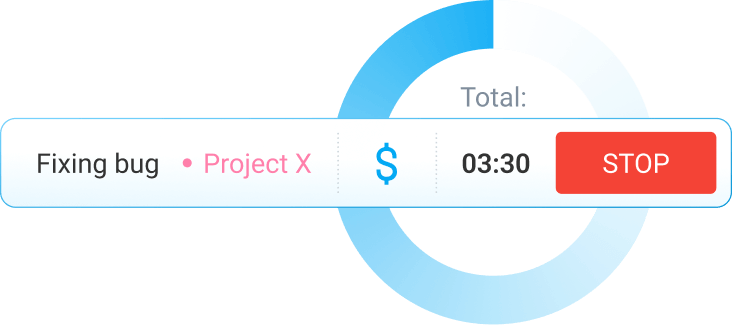Time Tracking Benefits
All businesses where employees spend most of their working hours away from the office or working on a computer can benefit from time tracking.
- What is time tracking?
- Who tracks time and why?
- How can time tracking save money?
- Time tracking benefits for teams
- Time tracking benefits for small businesses
- Time tracking benefits for managers
- Time tracking benefits for freelancers
- Time tracking benefits for clients
- How to start tracking time?
- What activities to track with a time tracker?
- Different types of time tracking software and how to use them
What is time tracking?
In essence, time tracking is the process of recording the time spent on work, certain tasks, or projects.
If you’re just starting out with time tracking, you might be looking for answers to some of the following questions:
- Why track time?
- Why is time tracking important for work and other activities?
- How can employees benefit from tracking time?
- How can you track time and what are the best methods?
- How can you choose the best time tracking software?
- How can you avoid working more than you should and overworking yourself?
Stay tuned because we’re going to answer these questions for you in the next paragraphs.
Let’s find out who are the people who use time tracking.
Who tracks time and why?
Most of us are part of the business world in some way.
And, most businesses in that world rely on time tracking software, especially if their employees spend a lot of time working on a computer or away from the office.
Time tracking is useful and beneficial for all businesses that:
- Work with clients,
- Bill by the hour,
- Have a remote or hybrid work arrangement,
- Offer flexible working time, and
- Want to improve productivity and profitability.
Overall, many professions, organizations, and businesses can benefit from tracking their work hours. They include:
- Freelancers and independent consultants,
- Hybrid, remote, and virtual teams,
- Businesses with field workers,
- Businesses that work with clients,
- Businesses that bill by the hour,
- Businesses that want to improve productivity, and
- Businesses that offer flexible working hours.
Let’s see how and why they track time.
Freelancers and independent consultants
Most freelancers and independent consultants use time tracking to:
- Show their clients proof that they did the assigned work, usually in the form of reports,
- Record all idly spent time so they can minimize distractions and procrastination while working from home,
- Boost productivity by setting deadlines for micro-tasks within a project,
- Create better estimates for future projects by analyzing the time it normally takes them to finish projects, and
- Keep track of their billable hours so they can invoice clients and analyze whether they're charging enough for their work.
Hybrid, remote, and virtual teams
Most hybrid, remote, and virtual teams use time tracking to:
- Provide proof they worked on their assignments,
- Motivate team members to be productive, and contribute equally,
- Make straightforward schedules, available to all team members,
- Encourage team members to practice accountability and responsibility when working from home, and
- Use time records as a basis for calculating payroll and making sure each employee is compensated fairly.
Businesses with field workers
In a business that employs field workers, such as construction companies, time tracking can help:
- Track work from afar, considering that the project manager can't supervise everyone personally,
- Enable field workers to send detailed reports on their progress,
- Make sure the workers' progress is well documented, so they can be paid accordingly, and
- Improve the overall communication between the project manager and the field workers.
Businesses that work with clients
Businesses that work with clients are various agencies, tech and IT companies, and even non-profit organizations.
These businesses use time tracking to:
- Create a trustworthy relationship with the client by allowing them to receive accurate information about the project progress and cost estimates,
- Bill clients more accurately, based on the actual cost of the project and the time and resources necessary to finish it, and
- Assess the profitability of their projects by looking at the time reports and asking themselves:
- Are we charging according to our actual work or should we raise our rates?
- Are we focusing on profitable projects or are we spending too much time on unprofitable activities?
Businesses that bill by the hour
Companies that work with clients and bill by the hour, such as law offices, use time tracking to:
- Generate invoices based on the time they spent working on a project and their hourly rates,
- Bill more accurately, as every second that went into a project is carefully documented, and
- Maximize revenue.
Businesses that want to improve productivity
Even businesses that don't work with clients but are interested in getting more efficient, rely on time tracking to help assess their employees’ productivity levels.
They want to know two things:
- Are employees achieving the desired results within deadlines?
- Or are they spending too much time being idle?
Time tracking will help employees evaluate how they spend their working hours and motivate them to be more productive and better organize their time.
25 ways to increase productivityBusinesses that offer flexible working hours
Businesses with flexible working hours track time to:
- Provide reports on when employees arrive to work, when they leave, and how much time they spend at the office;
- Create accurate payroll, and
- Record overtime, PTO, and vacation.
How can time tracking save money?
The actual amount of money time tracking can save you depends on:
- The size of your company,
- The number of members in your team, and
- The complexity of client billing.
However, there is a significant difference between the revenue of companies that track time and those that don't.
Unlike companies that don't track time, companies that track time:
- Are aware of the amount of workload they can take on within a certain time period,
- Are aware of their team's productivity levels, and
- Are better at estimating deadlines and expenses.
All of this leads to more quality projects and stronger relationships with clients.
These clients usually become returning clients who gladly spread the word about your company.
Finally, clients who spread the good word about your company attract more clients and help increase your revenue.
Moreover, time tracking software can save you money by automating a lot of administrative work and helping you analyze where you spend your time.
Let’s learn how.
Time tracking increases productivity
Time tracking helps you gain a better insight into how you spend your time, so you can prioritize better.
For example, if you're trying to improve your productivity, you can time track your typical workday and analyze how you've spent your time.
After viewing a time tracking report of your day, you can:
- Prioritize better,
- Create better schedules, and
- Gain motivation to be more productive.
| Your daily time tracking report | ||
| 09.00–09.20 | Checking your inbox and replying to emails | 20 minutes |
| 09.20–10.00 | Delegating work to team members | 40 minutes |
| 10.00–10.30 | Doing research for a projects | 30 minutes |
| 10.30–10.50 | Checking your inbox and replying to emails | 20 minutes |
| 10.50–11.50 | Administrative tasks | 1 hour |
| 11.50–12.15 | Browsing your Instagram feed | 25 minutes |
| 12.15–12.45 | Lunch and coffee break | 30 minutes |
| 12.45–13.45 | Helping a team member with a task | 1 hour |
| 13.45–14.00 | Browsing today’s trending news on Twitter | 15 minutes |
| 14.00–14.20 | Administrative tasks | 20 minutes |
| 14.20–14.50 | Checking your inbox and replying to emails | 20 minutes |
| 14.50–15.40 | Discussing a project issue with your team | 40 minutes |
| 15.40–16.40 | Reviewing project documents | 1 hour |
| 16.40 | Reworking the project schedule | 20 minutes |
This time report can help you identify:
- How much time you spend on mundane tasks (the 1 hour you spent on checking your inbox and replying to emails),
- The time you could spend on more important tasks, and
- The time you spent on non-work-related activities (the 40 min you spent on social media).
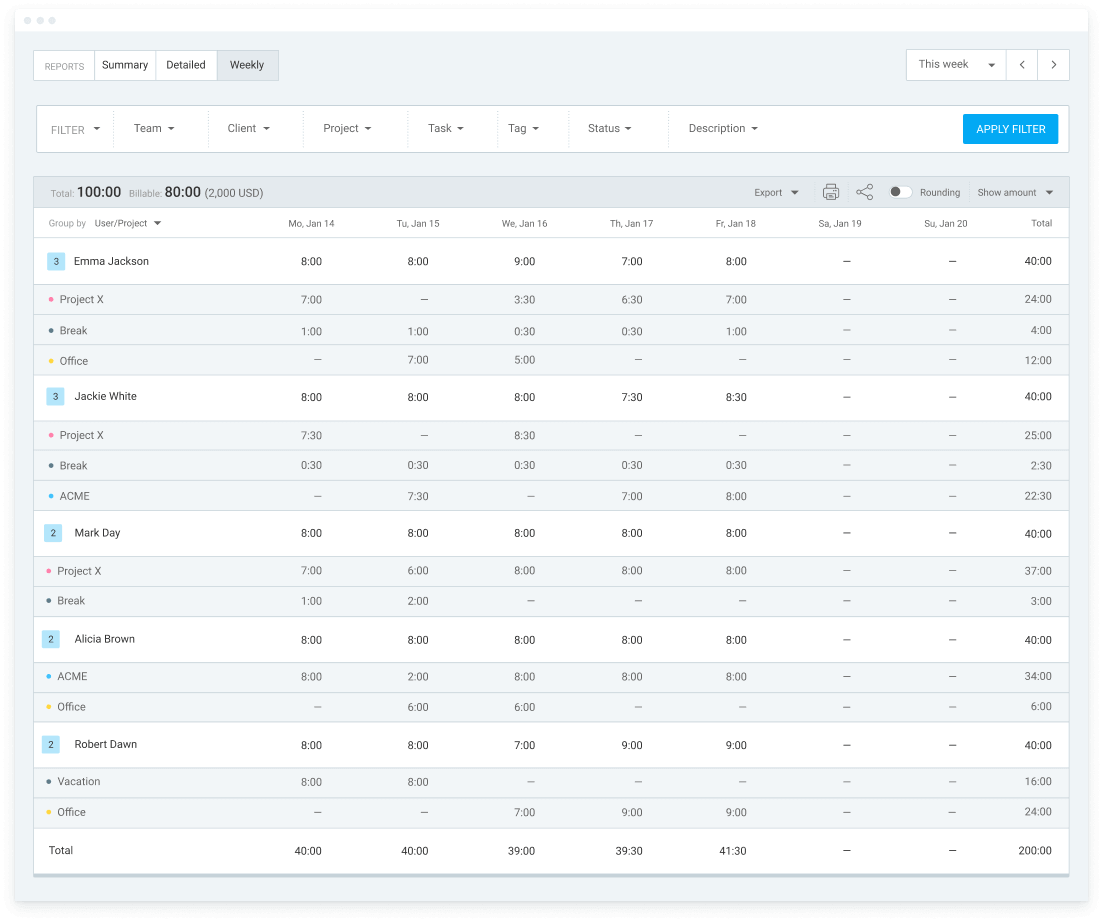
Once you become aware of how you spend your time at work, you can aim at being more productive and efficient.
Being more productive and efficient will help you:
- Get more things done,
- Earn more, and
- Save more money.
Time tracking helps you make better project cost estimates
Another way time tracking methods can help you save money is by enabling you to track time you spend on projects and better understand the actual project costs.
Maybe you don't actually charge your clients the rates you should be charging.
For example, imagine you encounter some issues while working on a project, and finishing everything takes longer than expected. The project costs rise beyond your initial estimates because of this, so you have to present that to the client.
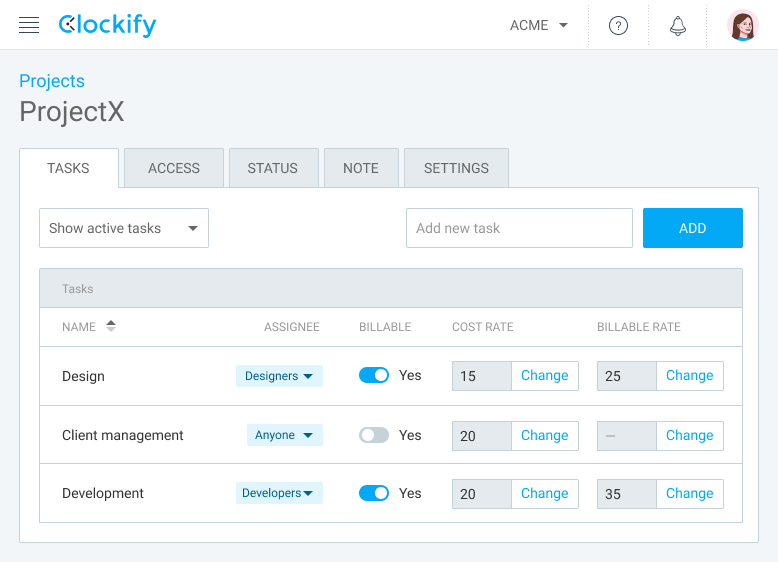
With the help of time tracking software, you're able to generate accurate reports to present to clients and point out all the issues that led to increased project costs.
Moreover, you're able to create better estimates for future projects and save money in the long run.
Time tracking saves the time spent on paperwork
Running a modern-day business without time tracking software would translate to doing all the important paperwork manually.
This robs you of the time you can otherwise spend on more profitable activities.
For example, if you don't use time tracking software, you will have to manually:
- Go through reports (20 min),
- Calculate how much each employee needs to be paid (30 min), and
- Fill out invoices (30 min).
This amounts to 1 hour and 20 minutes every day, or 6 hours every week you spend on paperwork. If you bill your work by the hour, that's 24 hours' worth of lost profit per month.
If your hourly rate is $50, that means you could save $1,200 per month by simply using a time tracking app.
Time tracking software helps you save time and money by automatically generating reports, invoices, and handling payroll in a matter of minutes.

We’ve gone through the general benefits of time tracking for saving your time and money.
Let us now dive a little deeper and learn the benefits of time tracking for:
- Teams,
- Small businesses,
- Managers,
- Freelancers, and
- Clients.
Time tracking benefits for teams
Working in a large team comes with a set of specific challenges:
- You’re not sure if everyone is doing their share of work.
- You can’t anticipate how long it will take your team members to complete their assignments.
- You can’t guarantee that your team is working on their assignments at all.
Things become even trickier in remote or hybrid teams, both for managers and team members.
You and your team members might be unaware of how much time everyone spends on certain tasks or if everyone is doing their share of the work. In such a setting, it becomes much more difficult to synchronize all work and complete projects within set deadlines and budgets.
Thanks to time tracking software, both managers and team members can gain insight into what every team member is doing and when.
This will allow the entire team to work more efficiently and come up with better schedules.
It will also help teams achieve better results on future projects.
In essence, time tracking helps teams:
- Maintain high motivation and productivity levels,
- Resolve potential issues and conflicts,
- Organize and prioritize better, and
- Reach personal and shared goals more quickly.
Time tracking maintains high motivation and productivity levels
With time tracking, it becomes possible to know what your team members do during work hours and how much time they spend on each activity.
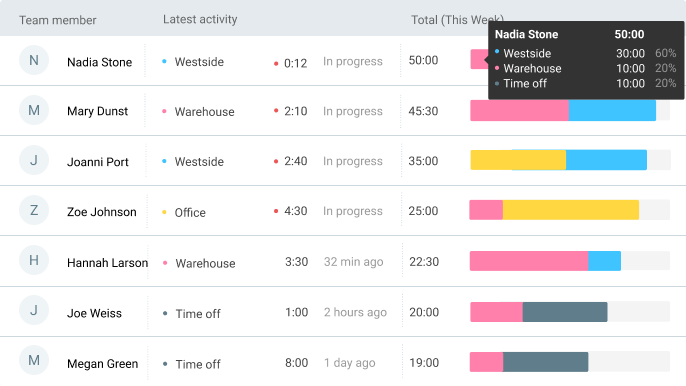
When team members record their time and make it public, it becomes inevitable that they start comparing results.
They may ask themselves:
- Why are Helen's time results better than mine?
- Why do I spend so much time on unprofitable activities and being idle?
- What can I do to improve my results?
These questions can be quite motivational and inspire team members to be more productive and in control of their time.
Time tracking resolves potential issues and conflicts
Sometimes, there may be a problem with a project segment, causing a delay in the project delivery.
But, if your team is using time tracking software, identifying the root of the problem becomes much easier.
Once everyone discloses their time tracking results, your team may be able to learn who is having issues and with what. When they do, the next step is to resolve these issues together.
Moreover, conflicts may arise regarding the amount of time allocated to finishing a project.
Why can this be a problem?
Well, different team members may have different opinions on how much time it will take to get the project done. So tracking the time they spend on each segment will give room for improvement within the following segments.
Thanks to tracking their time, team members will have a better understanding of the time it takes them to finish their assignments. Consequently, they'll be able to set more accurate project deadlines.
Time tracking helps you organize and prioritize better
When teams rely on time tracking in their daily work, they are more likely to organize their schedule better.
This mostly refers to being able to prioritize their tasks based on urgency, importance, or profitability.
Better organization and prioritization mean that the team will be more likely to finish their assignments within their deadlines.
What’s more, by organizing and prioritizing their tasks better and focusing more on profitable activities, teams help cut project costs.
Time tracking helps you reach personal and professional goals
When you work closely with your team, you probably come to the point where your professional goals align. You might all be aiming to do the following:
- Finish that project on time,
- Spend less time doing task A, or
- Focus more on the technical details of your reports.
I think you get our point.
How does time tracking fit into this scenario?
When team members track their time regularly, they become coordinated and find it easier to contribute to the team's overall results.
Moreover, they look up to and motivate each other to improve.
For example, if you want your time efficiency to be as good as your colleague's, you can analyze your tracked time in order to identify your time sinks and see what you can work on.
This would be your professional goal.
Once you do that, you can organize your time better and learn to prioritize to reach the personal goal of achieving the same, or better, time efficiency as your colleague.
Overall, time tracking can help motivate team members to work harder on reaching all of their goals — be they personal or professional.
This concludes the section on the benefits of time tracking for teams.
Let’s move on now to learn what time tracking can bring to small businesses.
Free goal tracker appTime tracking benefits for small businesses
Just like other businesses, small businesses have to finish projects within a deadline, get returning clients, generate profit, reach their goals — and all of this with a limited budget and fewer employees.
Because of these limitations in resources, time is a valuable asset to small businesses. You have to carefully allocate available time so that all aspects of a project are finished in the most efficient way possible.
In order to make use of available time and ensure people stay competitive, small businesses have to pay special attention to:
- Prioritizing tasks,
- Tracking all expenses,
- Keeping productivity at the highest level, and
- Avoiding bad habits, such as multitasking or procrastination.
If you own or work at a small business, time tracking can help you with all of these points.
Here’s how to do it, in more detail.
Time tracking helps prioritize tasks
In small businesses, employees often have to take on multiple roles within a project and juggle a lot of work, all within a strict deadline.
Small business owners are also pressed for time, as they have to supervise all employees and assignments.
When employees track the time they spend on each activity, it becomes clear how much time they put into assignments within a project.
By tracking their time results, small businesses can prioritize better because:
- Employees can focus more on learning what tasks are easier to do but more profitable. This can significantly improve their future projects, too.
- Owners can identify time-consuming and less profitable tasks. These should either be scrapped or reevaluated.
- If the amount of work starts increasing, small business owners can decide if they need to hire more people.
- Owners can learn if they are micromanaging. If they are, they should start delegating some of their tasks to other employees.
Time tracking helps track all expenses
Small businesses usually have a limited budget, so they have to manage tasks in a way that keeps their revenue at a healthy level.
It is vital that owners track all expenses and take into account:
- The profitability of their projects. Are certain projects actually profitable in relation to the time and effort that employees put into them? Or should you increase client fees? Time tracking can provide answers, so you can justify the rise in your rates.
- The contribution of employees. Are all employees contributing equal time and effort to their projects? Or are they costing the small business money by focusing more on unprofitable tasks and missing deadlines? Maybe they're even wasting their time on idle activities?
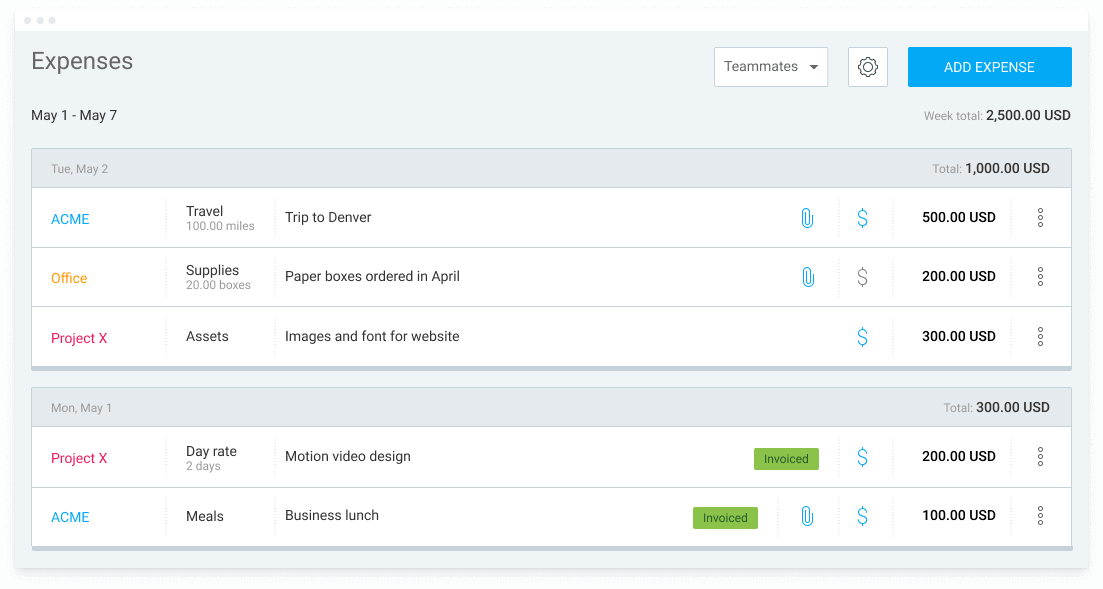
Once you prioritize profitable projects and assignments and make sure everyone is doing their share of the work, you can expect your expenses to decrease.
Time tracking helps keep productivity at the highest level
Keeping productivity high during working hours is the best thing you can do for your small business and your employees. Here’s why.
Employees can engage in 90 minutes of high-frequency activities
Working on one task for the entire workday with only one or two breaks will only make you feel drained and eager to finish, no matter the quality.
According to science, our brains experience 90 minutes of high-frequency activities, followed by 20 minutes of low-frequency activities.
This means that working for 90 minutes and then resting for 20 will help you concentrate better and achieve better-quality results.
Thanks to time tracking software, you can even schedule your breaks to make sure you really take them.
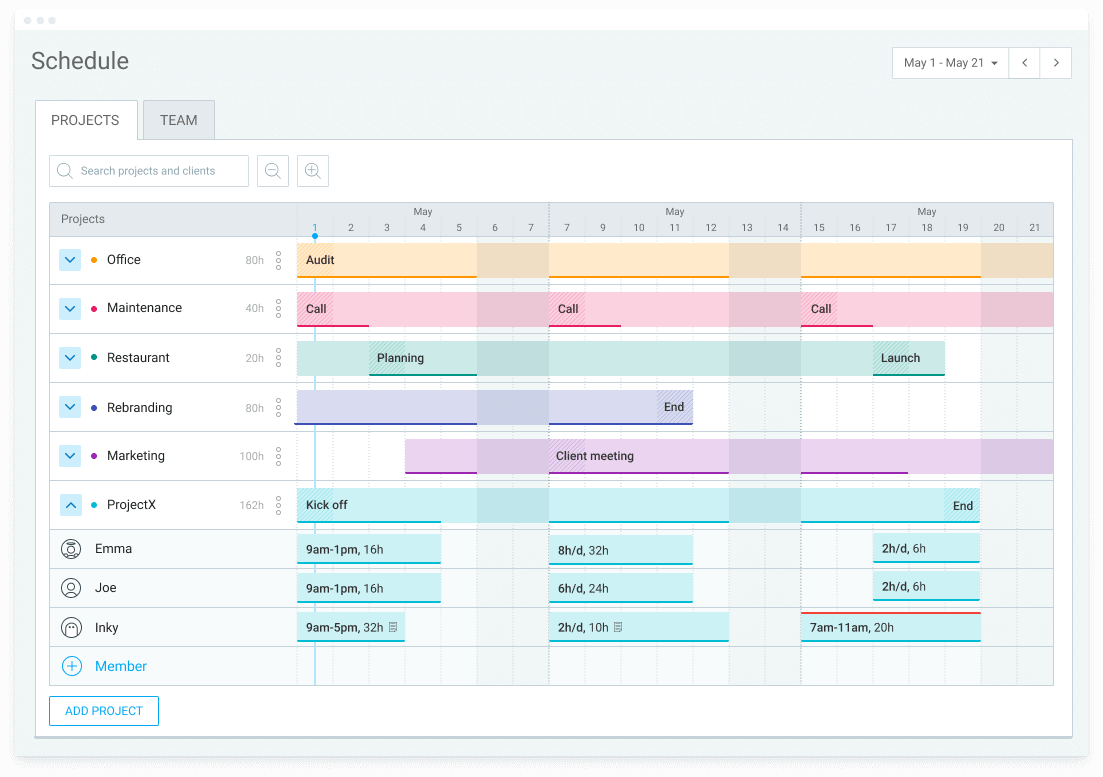
Employees can plan and distribute their time better
Answering emails and attending unproductive meetings aren’t your most important tasks.
But, even though they often bring little value to your work, you still have to address them sometime.
Yet, if you start tracking the time it usually takes you to answer emails you can:
- Practice,
- Designate a certain part of your day to answering emails — early morning or the end of your workday, and
- Plan your time in advance and reserve your most productive hours of the day for more important tasks.
Employees can have an insight into everyone’s time results
When everyone has insight into everyone else’s time results, it allows the team to compare their results and encourages them to be more productive and efficient.
When you know others are aware of how you spend time at work, you'll aim to be more responsible with your time.
This will motivate you not to waste hours answering emails, checking your phone, watching videos on YouTube, and procrastinating.
It will also encourage you to take advantage of your productivity and finish your most important tasks for the day first.
Time tracking helps avoid bad habits
For many, multitasking is a great way to finish more tasks in less time. Or is it?
On the other hand, procrastination is a habit many would love to get rid of.
But, in essence, both multitasking and procrastination can be your productivity’s greatest enemies.
How can time tracking help employees abandon these bad habits?
When employees track time, it becomes much harder to multitask or procrastinate. Employees have to record:
- When they started doing a certain task,
- When they finished a certain task, and
- The time they spent doing a certain task.
By doing this, they get more accurate time results and have a better insight into their daily schedule.
Once multitasking or procrastination are reduced to a minimum, small businesses can truly thrive.
Since many businesses depend on returning clients, becoming sustainable and building reputation and credibility should be a top priority. And, this is only possible if everyone does their share of work and finishes projects on time.
Time tracking benefits for managers
Managers are the most important link in any business organization because they:
- Coordinate all team members and oversee all project aspects,
- Supervise project costs, deadline estimates, and all employees in their teams,
- Handle vital paperwork,
- Establish a good relationship with the clients, and
- Carry information between team members and departments.
But, if managers don't know how much time each project requires, their job becomes much harder.
This is where time tracking can do its magic.
Thanks to time tracking software, managers can get all data they need and maintain control of their responsibilities.
Time tracking data provides different benefits to different types of managers:
- Project managers — Time tracking makes their paperwork and supervising easier.
- Corporate managers — Time tracking helps them oversee project costs, deadlines, and employees.
- Account managers — Time tracking helps them improve the company's relationship with its clients.
Let’s explore the advantages of time tracking for each group a bit further.
How can project managers benefit from time tracking?
When all team members track their time during work hours, the project manager can use this data to easily handle vital paperwork and supervise team members and their work.
Time tracking records make it easier to process all documentation, particularly, everyone's payroll.
You can easily calculate the amount of money that you should pay each team member, based on their total hours worked and hourly rates.
By tracking the team's time, you can make sure you don't underpay or overpay team members for the time they've spent working on a project.
If your team tracks their time, you can access everyone's time results and activity reports whenever you want.
This way, you'll know how each team member spends their time at work.
Analyzing your team's time tracking data will allow you to identify any time sinks and find the best way to deal with them.
How can corporate managers benefit from time tracking?
When all employees track their time, the corporate manager has an insight into the workings of the company.
Time tracking can help them answer some of the following questions:
- Is the client fee adequate for the effort and resources it takes to finish the project?
- Are projects always finished within deadlines?
- Are company resources divided the way they should be?
- How long does it take employees to finish certain types of projects?
- Are all employees at work?
- Are they all working on their assignments?
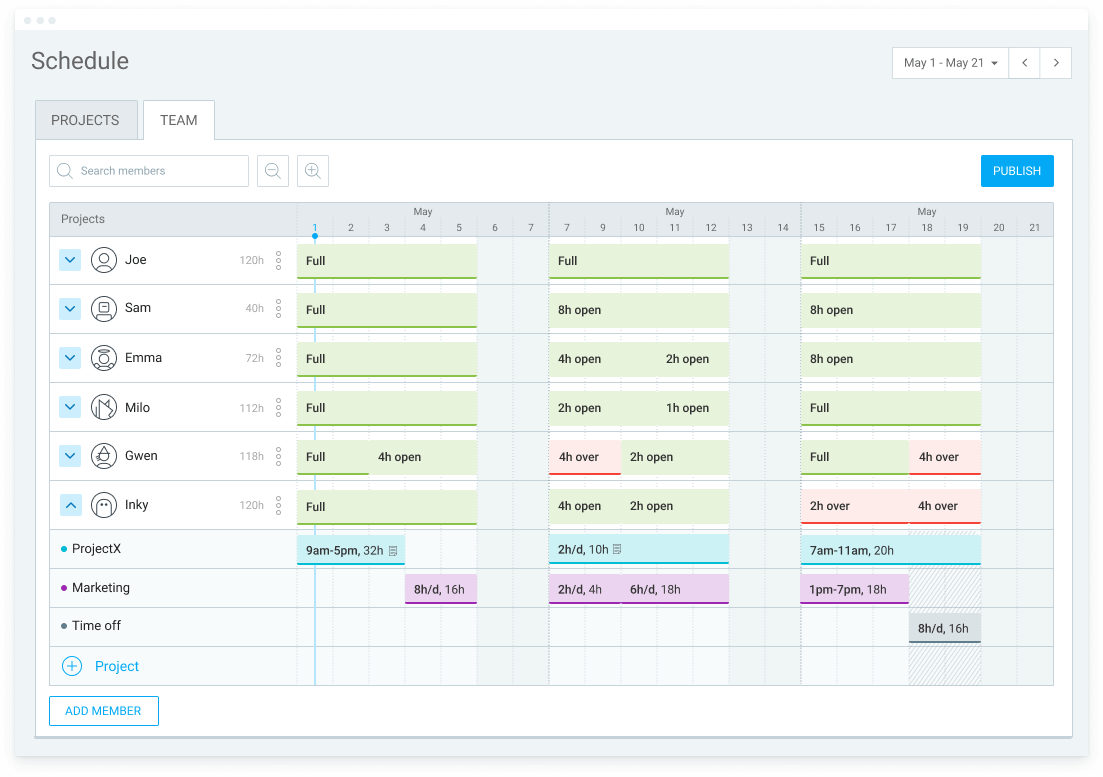
Time tracking results enable you to gain insight into current project progress and project costs and deadlines.
Thanks to these insights, corporate managers can create better plans and estimates for future projects.
How can account managers benefit from time tracking?
Account managers present a vital link between a company and its clients, and it’s their job to maintain a good relationship between the two.
Thanks to time tracking data, their job is much easier than it used to be.
When all team members track their time, you can use this data to:
- Show your clients accurate and detailed reports on the progress they’ve made,
- Answer all of their questions about expenses, and
- Provide your clients with regular updates on the status of their projects.
After all, building a trustworthy relationship with your clients should be your top priority in the long run.
Time tracking benefits for freelancers
If you're a freelancer, you're in charge of how you spend your time. This makes organizing your schedule all the more important.
Tracking time can help freelancers:
- Bill their clients accurately,
- Better evaluate their project costs,
- Improve their productivity, and
- Understand their work limitations.
Time tracking helps freelancers bill clients accurately
More often than not, freelancers have to communicate remotely with their clients.
Because of this, it's important that you document your work progress and the time you spend on all projects.
If you’re using time tracking software to document your work, you can generate accurate reports for your clients and determine your fees (total hours worked x hourly rate).
Moreover, tracking time helps you avoid being paid less than you deserve for your time and efforts.
Finally, it minimizes your chances of charging too much and helps you maintain a trustworthy relationship with your clients.
Time tracking helps freelancers better evaluate project costs
Evaluating and calculating project costs is much easier for freelancers when they can rely on a time tracking app.
How?
Well, time tracking can help you determine how much time you have spent on every task of each project.
How does this work in practice?
Example #1: Some freelancers may realize that they spend too little time on profitable segments of a project and too much time on unprofitable activities.
- It takes Mark 1 hour to answer emails during peak hours of the day.
- Solution: By using a time tracking app, Mark is able to minimize the time he spends answering emails and allocate it to a more profitable activity.
Example #2: Some freelancers may find that their hourly rates are too low for the time and effort they invest into finishing certain projects.
- Phoebe is undercharging her clients for her design work.
- Solution: By relying on time tracking software to figure out how much she should charge her clients, Phoebe makes the necessary changes to her hourly rates and creates better estimates for her future design projects.
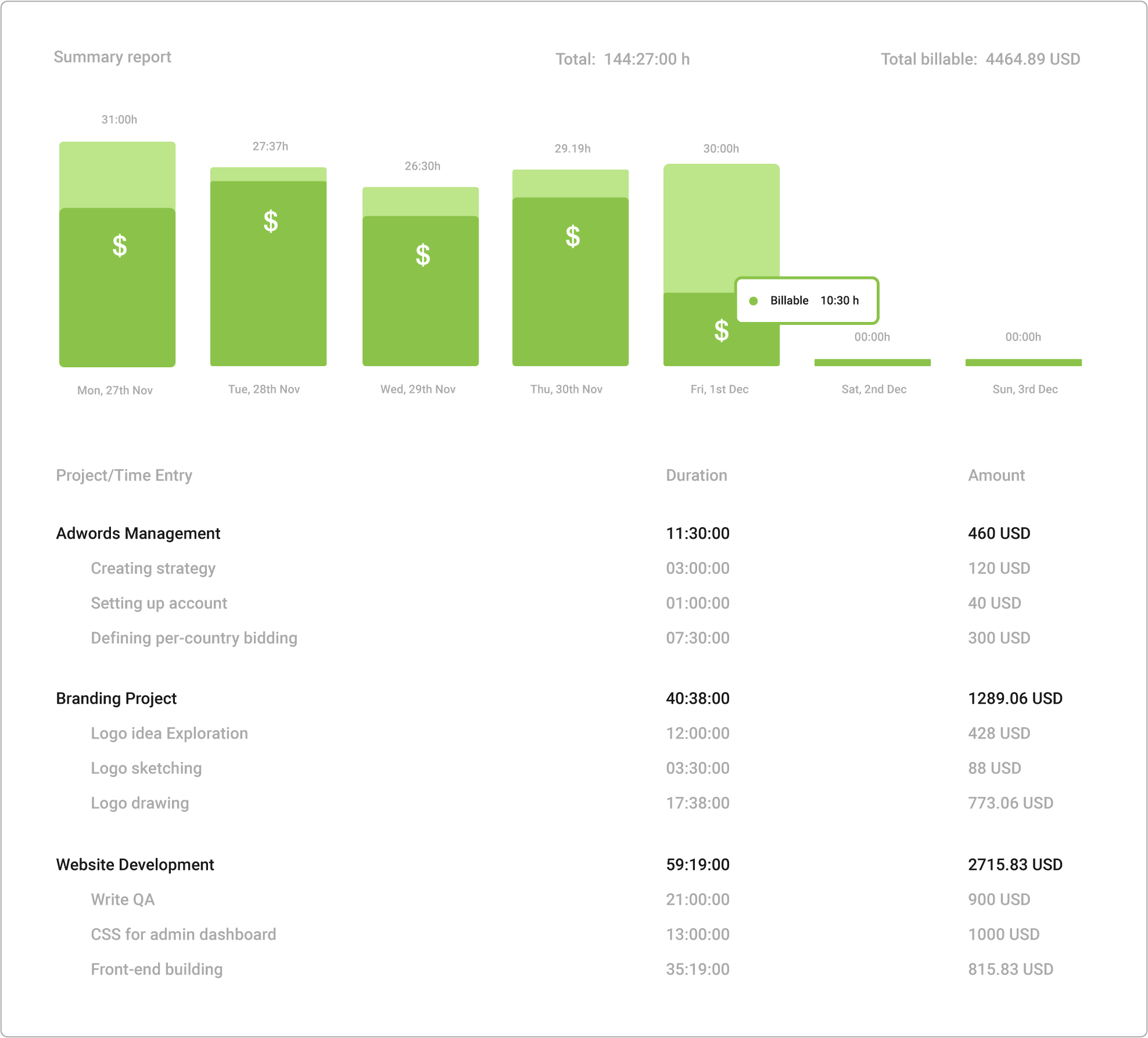
Time tracking improves freelancers’ productivity
Freelancers often work at home and find it more difficult to stay focused since they are more vulnerable to distractions and procrastination.
But, if you track your time during work hours, you’ll better understand if you use your time productively or not.
For example, if you want to assess your overall productivity, you can track every activity during the day.
At the end of the day, you may realize that you have spent:
- 65 minutes on YouTube,
- 40 minutes aimlessly browsing the web,
- 80 minutes on Facebook, and
- 95 minutes on Instagram.
That’s a total of 4h and 40min you spend idle during the day.
Once you understand what you’re wasting your time on, you'll feel motivated to be more productive and more responsible with your work hours.
Time tracking helps freelancers understand their work limitations
As a freelancer, you may feel that the more projects you take on, the more money you'll earn. But, that doesn’t have to be the case.
What’s more important for you as a freelancer is to understand your work limits.
How can you do that?
Well, if you start tracking time, you’ll understand how much of it you usually spend on completing one type of project. This way, you’ll realize if you’re taking on more work than you can handle.
For example, you’ve decided to take on 5 different projects to complete within a month.
This can end in two ways:
- You complete all projects within the deadline, but you’re not satisfied with the end results. You underperformed on all of them because you didn’t have enough time to focus on each project.
- You try to focus on each project individually and miss deadlines because a month isn’t enough for you to finish 5 different projects.
Once you determine the amount of work that is too much for you to finish within a certain time period, you'll be able to create better estimates for deadlines and the workload you should accept.
So far, we’ve talked about the benefits of time tracking for teams, small and large businesses, and freelancers. But what about their clients?
Let’s see how clients can benefit from tracking time.
Time tracking benefits for clients
Clients need to know whether they can trust you.
Your clients will rely on your time tracking data to:
- Have accurate estimates and quotes,
- Calculate accurate billing, and
- Get proof the project is progressing.
Let’s take a closer look at the advantages of time tracking for clients.
Time tracking helps make accurate estimates and quotes
When looking for a professional to take on their project, clients have to take into account their planned budget for the project and the ideal time when they'll want everything done.

By turning to a company or individual professional that tracks time during work hours, they'll know that the estimates for the deadlines and quotes are as accurate as possible.
Also, the chances for a sudden rise in expected fees will be minimal. They'll know the company or individual professional are aware of the time needed to finish such a project, so they'll have more trust in their deadline estimates.
Time tracking helps provide accurate billing
Teams that track the time they spend on a project can accurately calculate their total hours worked.
This means they can also charge their clients accurately because they'll have all the data necessary to bill clients according to their hourly rates.
Clients will never have to worry about overpaying or underpaying the people they hired for the job. They'll have access to reports that show all the completed assignments and expenses.
Time tracking shows that the project is progressing
Sometimes, clients can feel uneasy if they don't know how the project is progressing. They will probably ask the following questions:
- Is everything going according to plan?
- Will the project be finished on time?
- Are there any potential issues that may push the deadline?
And, if this project is a part of a larger business plan, clients will want to know whether they can start planning their further steps or not.
As part of their planning, clients can ask those they hired to send them time tracking reports on their progress. The reports will provide answers to all their questions.
These reports can be daily, weekly, or monthly, depending on the size of the project and the client's interest in its progress.
By having insight into these reports, the clients can learn:
- How much time it took to complete each segment of the project,
- Whether certain segments of the project are taking longer than estimated,
- Whether enough time is allocated to all the important segments of the project, and
- Whether they can expect unforeseen expenses before the project is completed.
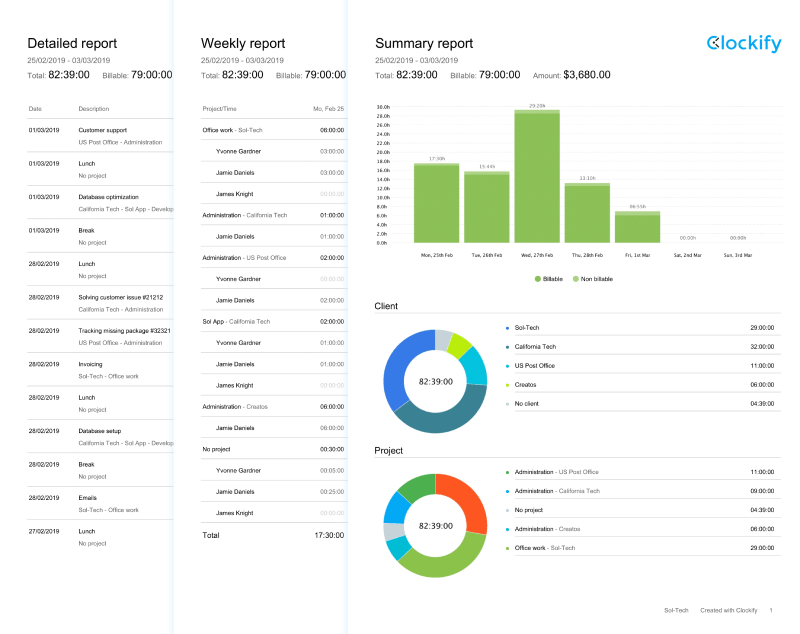
Once clients know all the facts related to the project progress, they can start working on:
- The next steps in their business plan,
- Allocating the rest of their budget, and
- Contacting others whose services they need.
Creating a trustworthy, long-lasting relationship with a client can be much easier with the transparency provided by time tracking software.
When clients hire people who track time, they'll know they have found professionals who value their own time, and who will, by extension, value the client's time.
How to start tracking time?
If you’re completely new to time tracking, let us guide you through time tracking basics.
Tracking your time is very simple, especially when you find the software you can use easily.
What are the crucial steps you need to take to start tracking time?
- Step 1 — The key is to write down what you spend your time on during the week. Remember to include all your tasks and activities.
- Step 2 — Once you complete each week, you can go over the data for the week, analyze it, and make adjustments accordingly.
While you’re examining your weekly time logs, you can ask yourself several things:
- How do you like your weekly schedule?
- Is there a particular activity that’s taking too much of your time?
- Is there a particular activity you would like to do more?
- Do you spend enough time working or not?
- Is there room for improvement?
Asking these questions will help you realize if you’re spending too much time scrolling through social media or if you could spend more time with friends and family.
Another important aspect to inspire you to start tracking time is finding the motive to do so.
Find your own motive for tracking time
You should remember that every person is different and has a different set of priorities. So it’s important to know why you have decided to track your time.
- You might want to cut down on the time you spend on non-work-related activities because you have an 80-hour workweek ahead of you.
- You could be looking for ways to boost your productivity and finish more in less time.
- You simply want to rearrange your priorities and be the best version of yourself at work and in life.
Once you’re clear on why you want to track your time and how you can do it, let’s see what activities you can track with a time tracker.
What activities to track with a time tracker?
Depending on your personal or professional needs, you can track time for pretty much everything.
People usually use time tracking software for:
- Tracking work hours
- Tracking and timing tasks
- Tracking and logging activities
- Tracking goals
- Tracking projects
- Tracking productivity
You now know how to track time, why to do it, and what activities to track. It’s time to learn what types of software you can use for all this.
Different types of time tracking software and how to use them
Depending on your specific preferences and work organization, different types of time trackers let you track time in different ways.
Best time trackers consolidate these diverse types of time tracking software into one versatile solution and are well suited for any business or use case. These include:
- Timesheet software
- Timekeeping software
- Time recording software
- Time clock software
- Automatic time tracker
Let’s see how each of these works.
How to Choose the Best Time Tracking SoftwareTimesheet software

With timesheet software, you can:
- Enter hours in an online timesheet app.
- Track attendance.
- Calculate each team member’s work hours.
- Calculate pay across teams and projects.
Timekeeping software
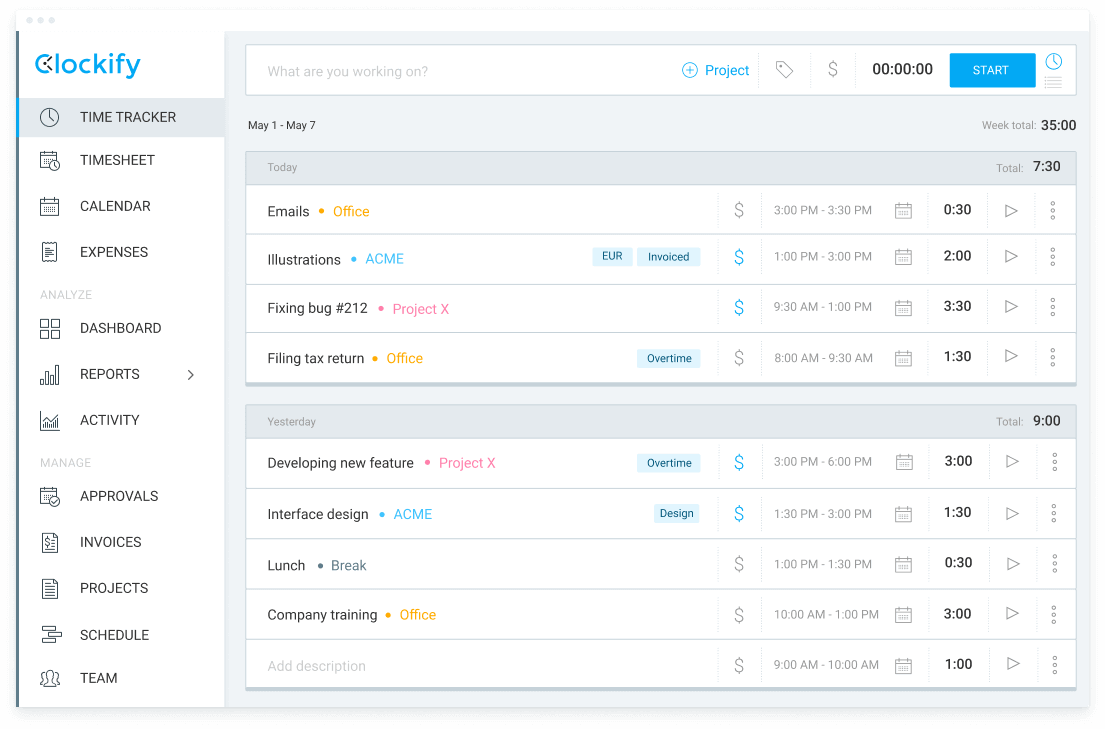
Thanks to proper timekeeping software, you can:
- Track time and fill out timesheets online.
- Create flexible and robust reports.
- Manage all your projects and tasks.
Time recording software
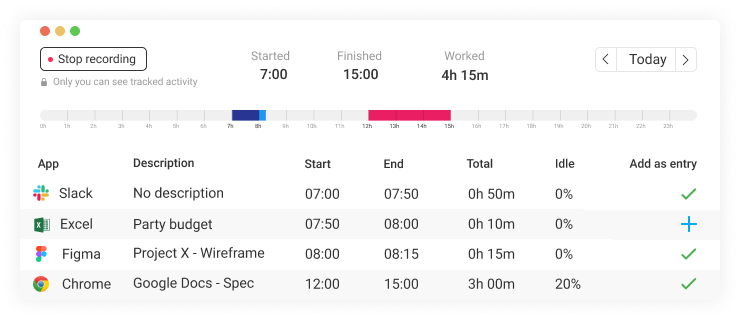
When you use time recording software, it allows you to track time in 4 ways:
With a timer
- Type what you're working on.
- Start the timer with one click.
- Stop the timer when you’re done.
- Continue the timer when you start working again.
By entering the time manually
- Enter what you were doing.
- Enter the duration.
- Add the time for recorded activity.
By using an auto-track time option
- Enable auto-recording of apps and websites you use.
- Analyze the activities you do during the day.
- Select which activities you want to add to the timesheet.
By recording time in a timesheet
- Select your activity.
- Enter duration under the corresponding day.
Time clock software
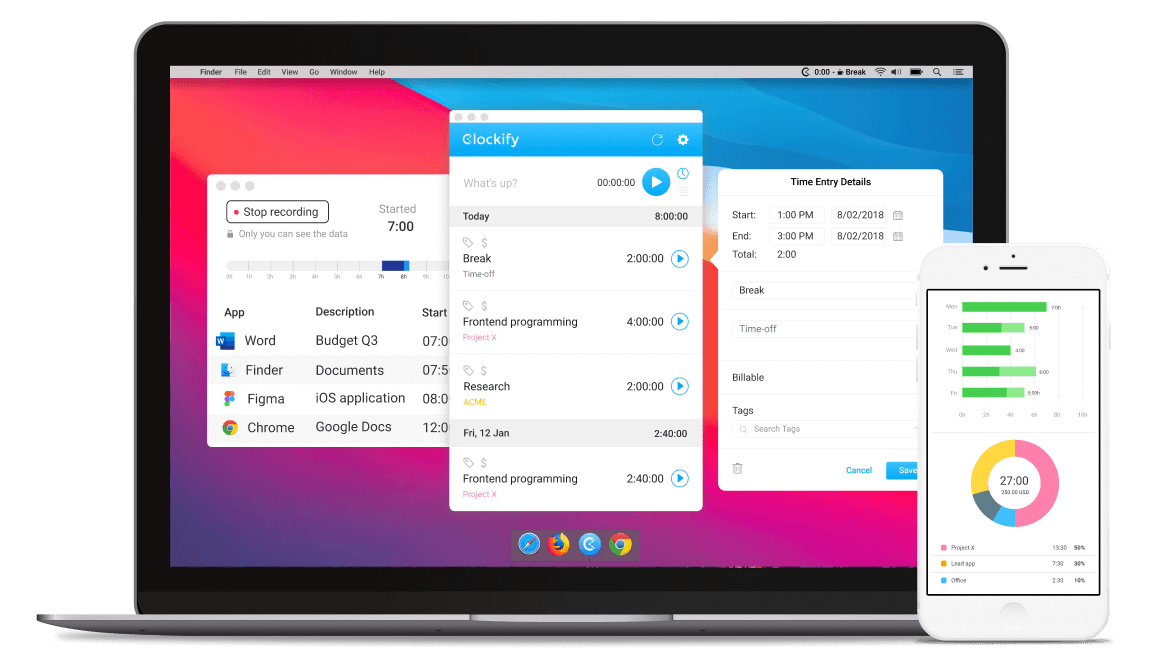
If you opt for time clock software, you will be able to:
- Track work hours across several projects.
- Calculate billable hours and labor costs.
- Track payroll.
- Track attendance, breaks, and time off.
- Track all the progress of all your projects and budget.
Automatic time tracker
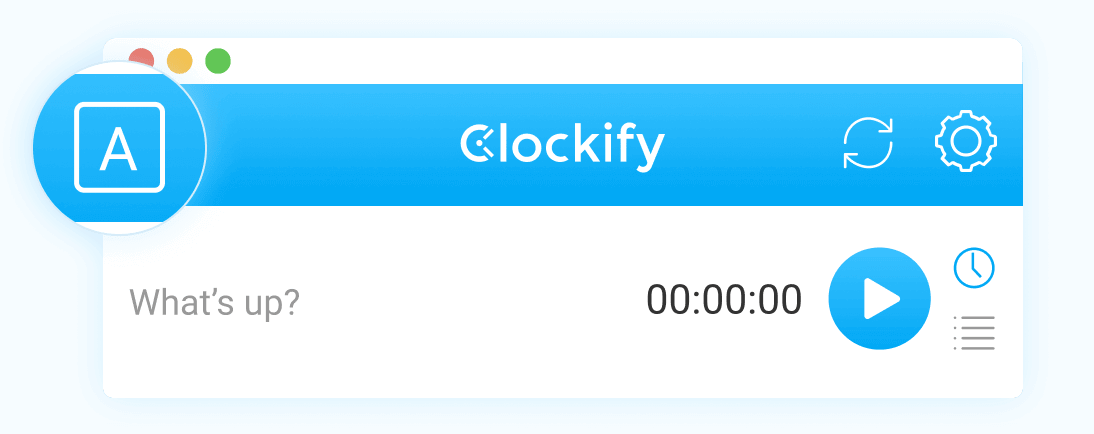
Automatic time tracking software can be installed as an extension and used to monitor and track the time you spend on certain programs and apps.
With automatic time tracking, you can:
- Generate detailed summaries.
- Set billable rates.
- Compare time entries to increase efficiency.
Why track time with Clockify?
Standing out from the crowd, Clockify is the most popular, most intuitive, and a very easy-to-use time tracker on the market.
Regardless of the size of your team, your place of work, or your work arrangement, Clockify by CAKE.com will be able to satisfy your time tracking (and other) needs.
If you manage both in-office and remote teams, you can monitor their productivity levels with the help of Clockify’s visual reports feature.
Moreover, freelancers and independent consultants can also rely on Clockify for time tracking and optimizing the time they spend on each project and client.
Thanks to its availability across platforms and devices, Clockify supports the flexible lifestyle adopted by many freelancers.
All in all, using Clockify can and will help you stay productive, improve your time management skills, and make overall progress.
